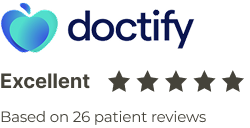Insights From World-Leading Stress Experts
For individuals in high-demand roles, work-related stress can feel like an inevitable cost of success. Long hours, relentless expectations, and high-pressure decision-making can quickly lead to physical and emotional exhaustion if left unchecked.
The Health and Safety Executive (HSE) reports that stress, depression, and anxiety account for over half of all work-related illnesses1. Studies also suggest that chronic stress increases the risk of heart disease, high blood pressure, and burnout2, making it a critical issue not just for professional performance, but for long-term physical health.
However, it’s worth noting that not all stress is harmful. A certain level of pressure can motivate individuals, sharpen focus, and drive achievement. The challenge lies in managing stress effectively – knowing when it’s productive, when it becomes overwhelming, and how to deal with it effectively.
Contact us today for expert help in managing stress at home.
H2: Why stress happens
Stress is a natural response to pressure3. It can sharpen focus, heighten awareness, and fuel motivation – all of which are crucial in high-performance environments. However, when demands consistently exceed an individual’s capacity to cope, stress can become chronic, damaging both mental and physical health4.
For individuals in leadership, media, or public-facing roles, stress is often multifaceted. It can stem from high-stakes decision-making, constant scrutiny, unpredictable challenges, and blurred work-life boundaries. Over time, this unrelenting pressure can lead to burnout, mental fatigue, and serious health concerns if not managed effectively5.
H3: Eustress vs chronic stress
Not all stress is harmful.
- Eustress – often called “good stress” – is the kind that pushes individuals to excel, enhances performance, and creates a sense of purpose6. It’s the feeling before walking on stage, the drive to meet a tight deadline, or the excitement of leading a major project.
- Chronic stress, on the other hand, is the constant, unrelenting pressure that takes a toll on individuals over time7. When stressors accumulate without relief, they can cause physical symptoms like headaches, sleep disturbances, and cardiovascular strain, as well as mental exhaustion, negative thoughts, and emotional detachment.
The key to sustaining high performance is learning to harness eustress while mitigating the risks of prolonged, unmanaged stress, before it takes a toll on health and wellbeing.
H2: Actions & initiatives to proactively mitigate stress
While stress is an inevitable part of high-demand roles, proactive strategies can help prevent it from escalating into burnout. By embedding healthy habits and structured initiatives into daily life, individuals can sustain peak performance without compromising their wellbeing.
H4: 1. Establish clear work-life boundaries
Blurring the lines between work and personal life is a common challenge for those in high-demand roles. Defining strict work-life boundaries – such as setting digital curfews, limiting after-hours emails, and protecting personal time – helps prevent work-related stress from seeping into home life.
H4: 2. Prioritise recovery & rest
Rest isn’t just about sleep; it’s about mental resets throughout the day. Short breaks between meetings, deep-breathing exercises, or stepping outside for fresh air can lower stress levels and improve cognitive clarity. Studies suggest that brief micro-breaks enhance focus, reduce tension, and boost overall resilience8.
H4: 3. Leverage delegation & support systems
Carrying too much pressure alone accelerates physical and emotional exhaustion. Effective delegation – whether to a trusted team, an executive assistant, or even external support – frees up bandwidth for high-priority tasks while reducing cognitive overload.
H4: 4. Cultivate a personal stress management toolkit
There is no one-size-fits-all approach to ‘good’ stress management. Some individuals benefit from exercise and movement, while others find balance through meditation, creative outlets, or structured downtime. Regularly incorporating proven stress-relief practices into a routine helps build resilience against overwhelming stress.
H4: 5. Proactively manage physical health
The link between chronic stress and physical health conditions – such as heart disease, hypertension, and fatigue – is well-documented. Prioritising regular exercise, balanced nutrition, and proper hydration plays a crucial role in maintaining energy levels and mental clarity.
H4: 6. Seek professional guidance when needed
Many high-functioning individuals may be reluctant to seek support, fearing it may be perceived as a weakness. However, engaging with occupational health professionals, mental health specialists, or executive coaches can provide tailored strategies for managing stress more effectively.
Reach out to us today for discreet, personalised, expert assistance with stress management at home →
H2: How to deal with stress at work
Managing stress at work requires a combination of practical adjustments, mindset shifts, and structured support.
- One of the most effective strategies is setting realistic expectations – both for oneself and for others. Those in high-pressure roles often push beyond reasonable limits, taking on too much in an effort to excel. Learning to prioritise effectively, delegate tasks, and say “no” when necessary can help alleviate unnecessary strain.
- Another key factor in reducing work-related stress is redefining productivity. Long hours do not always equate to efficiency. Research suggests that strategic breaks, focused work sessions, and mindful task management improve both performance and overall wellbeing9. Individuals who incorporate structured downtime and recovery periods into their day often experience greater resilience, sharper decision-making, and reduced emotional symptoms of stress.
- Communication also plays a crucial role. Engaging with human resources, trusted colleagues, or senior leadership can open pathways to additional support10; whether through workplace wellness initiatives, mental health resources, or flexible working arrangements. Despite the common perception that seeking help is a sign of weakness, addressing stress proactively is a sign of strong leadership and self-awareness.
- For those experiencing persistent stress at work, it may also be beneficial to explore expert support systems. Professional guidance from mental health specialists, executive coaches, or occupational health experts can provide tailored strategies to manage stress more effectively – ensuring that individuals can sustain high performance without compromising long-term wellbeing.
H2: Don’t struggle in silence
High-pressure roles demand resilience, but resilience does not mean enduring chronic stress alone.
Work stress, when left unaddressed, can erode physical health, mental clarity, and personal life; affecting not only job performance but overall wellbeing.
Recognising stress is not a failure – rather, it is an opportunity for strategic self-care and long-term success. Those who manage work-related stress effectively are not the ones who ignore it, but rather those who take proactive steps to mitigate its impact. Far from luxuries or indulgences, clear boundaries, structured support, constructive communication11, and a commitment to mental and physical wellbeing are essential to sustaining high performance over time.
Support is available, whether through professional networks, workplace initiatives, or expert mental health services. The most effective leaders, innovators, and high-achievers know that seeking help is not a sign of weakness – it is a mark of wisdom.
H3: References
- https://press.hse.gov.uk/2024/11/20/hse-publishes-annual-work-related-ill-health-and-injury-statistics-for-2023-24/
- https://www.hopkinsmedicine.org/health/wellness-and-prevention/risk-factors-for-heart-disease-dont-underestimate-stress
- https://www.medicalnewstoday.com/articles/145855
- https://www.yalemedicine.org/conditions/stress-disorder
- https://www.healthline.com/health/stress/effects-on-body
- https://www.verywellmind.com/what-you-need-to-know-about-eustress-3145109
- https://www.apa.org/topics/stress/chronic
- https://www.theguardian.com/science/2022/aug/31/short-breaks-can-help-boost-energy-at-work-study-suggests
- https://blog.lboro.ac.uk/wellbeing/2024/05/15/the-importance-of-taking-regular-breaks-at-work/#:~:text=Research%20shows%20that%20taking%20regular,equate%20to%20a%20better%20break.
- https://www.hrmagazine.co.uk/content/news/business-leaders-struggling-with-stress
- https://lpsonline.sas.upenn.edu/features/why-communication-essential-effective-leadership





